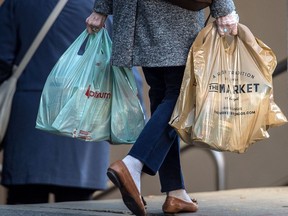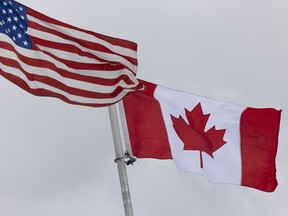Yes, the campaign was awful, but it might have been something we had to endure so that the next one won’t be
Article content
Too bad we’re not more like Germany. If we were, we might be speculating about which cabinet post Conservative leader Erin O’Toole would be taking in Justin Trudeau’s unity government.
Advertisement
This advertisement has not loaded yet, but your article continues below.
Article content
What about global affairs? An Air Force veteran, former corporate lawyer and leader of the party that won the popular vote would probably be taken seriously in Washington, Beijing and elsewhere.
But we’re not like Germany, a parliamentary democracy that has a history of forming relatively stable coalitions. In Canada, minority governments buy power, they don’t share it. We are all speculating about what Trudeau will have to pay to get Jagmeet Singh’s two dozen New Democratic members of Parliament to endorse the next budget. It will probably be expensive.
The hot take on the election was that a campaign about nothing also achieved nothing because the seat count barely changed. Pollsters had been telegraphing a hung Parliament for weeks. We’re a deeply divided country, and it was always going to take more than a world-beating vaccination rate to change that.
Advertisement
This advertisement has not loaded yet, but your article continues below.
Article content

“Annoyed,” said Adam Froman, founder and chief executive of Toronto-based Delvinia Holdings Inc., when I asked him how he was feeling the morning after the vote. “It showed how divisive things have become.”
The election was unnecessary. Parliament was working and, therefore, a nation whose mental health has been battered by the pandemic should have been spared a month of wedge politics. “Trudeau should wear this one,” Froman said.
Still, the campaign was more than a “$600-million cabinet shuffle,” as Lisa Raitt, the former Conservative cabinet minister, quipped during her television gig on CBC’s Election Night.
There were subtle shifts that could affect the political discourse going forward. Yes, the campaign was awful, but it might have been something we had to endure so that the next one won’t be. And if Team Trudeau’s biggest weakness is arrogance, it might finally be humbled enough to get better at listening to those with a different worldview.
Advertisement
This advertisement has not loaded yet, but your article continues below.
Article content
The election was so underwhelming, it at least lets us hit reset. Let’s exhale. Let’s move forward
Adam Froman
Trudeau is now the tarnished leader of consecutive minority governments, not the young prince who won a surprise majority in 2015. Chrystia Freeland, the Deputy Prime Minister and a former journalist, was reprimanded by Twitter for spreading an aggressively edited video that mischaracterized O’Toole’s position on universal health care. The Liberals are weaker. That could be a good thing for the rest of us, assuming self-preservation forces them to govern more constructively, perhaps by mending fences with the business community, a group Trudeau has alienated.
It wasn’t all bad for the Liberals. They won a seat in Calgary and another one in Edmonton, so Alberta’s perspective on climate policy will be represented in caucus — and quite likely in cabinet, too. Former trade minister Jim Carr, who has been advising Trudeau as a special representative for the Prairies, won in Winnipeg.
Advertisement
This advertisement has not loaded yet, but your article continues below.
Article content
The next government will have better representation from the West, which should make it more legitimate when it tangles with Alberta Premier Jason Kenney and Saskatchewan Premier Scott Moe over climate change, an existential threat, but also a generational economic opportunity that Canada’s political class has refused to aggressively confront.
“We’re in a moment right now as a society where it’s time to start really sitting down and collaborating and listening to one another,” said Alicia Dubois, chief executive of Alberta Indigenous Opportunities Corp.

Looser fiscal policy on the way if Liberals are to woo ‘likely dance partner’ NDP

What the election outcome means to the economy, stocks and the loonie

David Rosenberg says Trudeau’s win puts capitalists in ‘penalty box’
Advertisement
This advertisement has not loaded yet, but your article continues below.
Article content
To that end, maybe the most important outcome of the election is that it forced O’Toole to disclose the distance he would be willing to travel across the political spectrum to become prime minister. The Opposition leader unveiled a vision for a modern conservative party that could become a viable alternative for all those centrist and pragmatic voters in the Greater Toronto Area that the Liberals take for granted. It’s possible now to imagine a stable Conservative government in the future, rather than one that lucked into office on a wave of rural protest.
Voters will benefit from the competition, so will entrepreneurs, executives and investors. Stephen Poloz, the former Bank of Canada governor, reminded the audience of a virtual event hosted by the Canadian Association for Business Economics earlier this month that political uncertainty has become a significant drag on investment. The Great Recession blew apart a policy consensus that provided a solid economic foundation for two decades.
Advertisement
This advertisement has not loaded yet, but your article continues below.
Article content
The election of Donald Trump in the United States and all that followed is the best example of Poloz’s point, but Canada has also suffered from political polarization, especially when it comes to climate change. The opportunity cost of our inability to decide on a coherent approach to pipelines, for example, was enormous.
But those are sunk costs now. A serious country would stop fighting over what’s already been lost and set itself to make up for those losses in the shift to a greener and digitally oriented economy. O’Toole’s embrace of a carbon price makes that possible, as does his decision to consider a more active role for the government in supporting technology companies. He broke with his party’s obsession with balanced budgets, meaning anyone thinking of investing real money in Canada can do so without having to worry too much about a sudden shift to austerity.
Froman’s mood improved somewhat as he searched for silver linings. One positive, he said, is that Canada appears to have achieved political unity on the environment and climate change. That’s more than nothing. “Green technology is a huge opportunity for Canada,” he said. “The election was so underwhelming, it at least lets us hit reset. Let’s exhale. Let’s move forward.”
• Email: kcarmichael@postmedia.com | Twitter: CarmichaelKevin
Advertisement
This advertisement has not loaded yet, but your article continues below.
The ‘election about nothing’ could become an opportunity for something
2021-09-21 21:42:04






